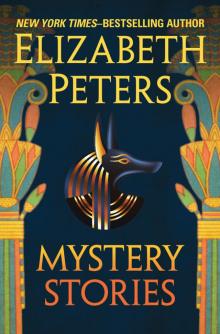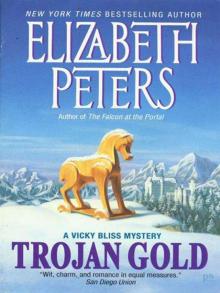- Home
- Elizabeth Peters
Laughter of Dead Kings vbm-6 Page 3
Laughter of Dead Kings vbm-6 Read online
Page 3
A knot under my breastbone loosened. I hadn’t believed it—not really—but I hadn’t laid eyes on him for two weeks, and the modus operandi, as we sleuths say, was reminiscent of some of his deals.
“Your gang,” Feisal began, only half convinced.
“I don’t have a bloody gang! Gangs are composed primarily of extremely stupid, dishonest individuals who are for sale to the highest bidder. I learned from painful experience I couldn’t trust anyone except myself. That’s why I—”
“John,” I said sharply.
“Oh, right.” He glanced at his watch. “I need to know a lot more about this, but as Vicky so rightly reminded me, we’re running out of time. Can you be the charming, debonair guest with Schmidt and his girlfriend? He mustn’t get wind of this.”
“Allah forbid that he should,” Feisal said. He looked a little more…well, no, not more cheerful. A little less haggard. “I’d better go. Schmidt has an unfortunate effect on my nerves, which are already shaky. Call me after he’s left.”
“Where are you staying?” I asked.
Feisal looked blank. “I don’t know. I came straight from the airport.”
From the street outside came the familiar squeal of abused tires. I knew that sound. “Oh, my God, it’s Schmidt,” I exclaimed. “He’s early. What are we going to do?”
Thoroughly rattled, Feisal bolted for the door. Caesar followed, barking helpfully.
“Upstairs,” John ordered. “Second door on the right.”
Feisal didn’t stop moving, he spun in a circle and ran toward the stairs. John picked up his briefcase and thrust it at him. “Lock the door. We’ll tell you when the coast is clear. And don’t make a noise!”
Feisal stopped halfway up the stairs. “What if I have to—”
“Improvise,” said John through his teeth. The doorbell rang. Caesar barked. Feisal let out a faint scream and fled.
“Deep breath, Vicky,” John said. “Once more into the breach, dear friends. Into the mouth of death, into the jaws of hell…Or is it the other way round? I’ll get the door, shall I?”
Still incapable of speech or movement, I nodded. It will be all right, I told myself. Just keep Schmidt amused and unwitting for a few hours. I should be able to do that.
John flung the door open with what had been intended to be a jovial greeting. It ended in a catch of breath, and then I also saw the woman with Schmidt. His new girlfriend. Suzi Umphenour.
That wasn’t her real name. It was the name by which I had known her when she was a fellow passenger on the ill-fated Queen of the Nile during my last trip to Egypt—our most recent criminal investigation, as Schmidt called it. My assignment had been to identify a notorious thief who was purportedly about to rob the Cairo Museum. Suzi played the silly society matron from Tennessee with such panache that I probably should have suspected it was a caricature; but I had had other things on my mind and I didn’t find out who—or what—she really was until after the grisly affair was over and I encountered her again in a certain office in the U.S. Embassy in Cairo. Her precise affiliation had never been made clear. Interpol? Some set of initials? CIA, NSA, BFAE?
I might have known Schmidt would take up with her. He had described her as “a fine figure of a woman.” That’s been the story of my life: if something can go wrong, it will. Of all the people in the universe, the last one I wanted to see on a night like this was a woman who worked for an organization that tracked crooks. FBI, BFE, DAR, AA, PETA?
All that and more swirled around my befogged brain as I stood frozen.
“Surprise!” Schmidt shrieked. “A night of surprises, is it? John, my friend, how good to see you! You remember Suzi? She is my surprise!”
“And a very pleasant surprise,” said John, making a valiant effort. “Do come in. Let me take your coats.”
Schmidt was loaded down with parcels. “I take them to the kitchen,” he announced.
I followed him. Compared with Suzi, Schmidt was the lesser of two evils. “These in the refrigerator,” he announced, suiting the action to the words. “These on…” He looked down into the hopeful face of Caesar. “On the high shelf. And here is wine.”
I took the bottle he handed me. “I didn’t know you and Suzi were an item.”
Schmidt smirked. “I don’t tell you everything, Vicky. Yes, we have been friends for some time. Good friends.”
If he giggles, I thought, I’ll hit him with this bottle.
Schmidt struck a pose, hand on hip, chin lifted. “You have not told me how well I look.”
I hadn’t really looked at him. Same old Schmidt, five feet six standing on tiptoe, round as an orange and rosy as an apple, bristly white mustache…Wait a minute. Not white—brown. Rich, decisive brown. If I hadn’t been so bemused by Suzi I would have seen it immediately. Other details began to penetrate. The cheeks weren’t quite as plump or florid, the stomach had retreated behind what appeared to be a solid barrier of some kind.
“You dyed your mustache,” I said.
“Not dyed; brought out the natural color,” said Schmidt indignantly. “It is a special formula designed for prematurely gray individuals. Is that all you see?” He thumped his stomach, winced, and went on, “I have lost twenty pounds. I am fitter than most men half my age. Would you like to see my pecs?”
“Good God, no! I mean…” This new development almost made me forget Feisal, the missing mummy, and gimlet-brained Suzi, who must not, MUST NOT get wind of either of the former. “You look great,” I mumbled. “Was that where you were? At a fat…uh, I mean, a spa?”
“A scientific health clinic,” Schmidt corrected. “In Switzerland.” Selecting a knife from the rack above the counter, he sliced cheese and apples onto a plate. (Apples? Schmidt?) “Come, we must join our friends. Er—I would appreciate it if you would not mention the clinic to Suzi.”
From the look of relief on John’s face I deduced he had found conversation heavy going. Catching my eye, he supplied me with a drink. It was mostly tonic, I discovered with regret. He was right, though; we needed to keep our wits about us.
For the next half hour Schmidt did most of the talking. My God, it was boring. Calories, saturated and unsaturated fats, carbs, the glycemic index, the food pyramid, the ratio of this to that and that to whatever peppered his speech. Red wine was mentioned, and so was dark chocolate. There wasn’t a food fad, scientific or pseudo, Schmidt had missed. John listened in open fascination. His gaze kept moving from the plate of sliced apples to Schmidt’s bright-brown mustache to the bottle of wine. (Red wine, of course.) I watched Suzi.
As a Southern belle she had affected masses of blond hair, a toothy grin, and a well-developed, ostentatiously displayed figure. The last time I had seen her, at the embassy, she had worn a tailored suit, very businesslike. Only the grin had been familiar. It was still in evidence, but her hair was short and there were glints of silver in its sandy waves. I wondered how old she was. Over forty, under sixty? It’s hard to tell these days. Her trim figure suggested she worked out regularly. Tonight she was casually dressed in jeans and T-shirt, the latter loose enough to be discreet but tight enough to make Schmidt’s eyes keep wandering back to her chest. There was no doubt in my mind that Schmidt’s interest was romantic, not professional. But what about her?
I tried to remember the details of that last conversation I had had with Suzi. They were foggy. I’d been somewhat upset, or, to be more accurate, mad as hell. When I agreed to go on that damned cruise I had been assured that the anonymous officials who sent me would have an equally anonymous agent on board who’d come to my rescue in case there was trouble. There was plenty of trouble, and Suzi had screwed up. It wasn’t entirely her fault, and most of my fury had been directed at her bosses, whoever they were. Anonymous. I hate those people—FBI, CIA, all of them. They are so obsessed with security, it supersedes everything else, including the welfare of the people they are supposed to be protecting. They don’t even talk to one another.
Whatever Suzi’s precis
e affiliation might be, it had to have something to do with art and antiquities fraud, otherwise she wouldn’t have been on that cruise. “Sir John Smythe” was still a subject of interest to several European governments, not to mention Interpol. My connection with that notorious crook was well documented. Suzi might not know that Smythe and John Tregarth, respectable dealer in legitimate antiquities, were one and the same, but at the very end of that interview she had said something…No, she hadn’t actually said anything, she had just looked as if…
Catching the notorious Sir John Smythe would be a feather in any agent’s cap. Was Suzi trying to get to John through me and to me through Schmidt? Or was I reading too much into a look, an imagined hint? Why couldn’t she have taken a fancy to Schmidt? I couldn’t visualize him as anything but my cute little, crazy little roly-poly pal, but that was no reason to suppose he wouldn’t appeal romantically to a woman. Chacun à son goût. He was funny, charming, brilliant, and, bless his heart, starving himself into relative—I said relative—fitness. Losing a little weight certainly wouldn’t do him any harm. But if Suzi broke his susceptible heart I would murder her.
What with eating and drinking and listening to Schmidt babble on about fitness we got through the evening. I kept trying to think of ways to draw Suzi out about her work without indicating why I had a personal interest. “Any unusual cases lately?” (a question that made John bite his lip and roll his eyes heavenward) elicited only a toothier grin and a bland “Nothing I can talk about.”
As a rule I have to kick Schmidt out while he’s still chattering, or put him to bed on the sofa if he has had too much to drink. That night he was the one who announced it was time to end our delightful evening. The look he gave Suzi was, as they say, meaningful. She gave him one back, and rose obediently to her feet. They did not linger over their farewells.
I stood by the door until I heard Schmidt gun the engine and roar away. Then I turned very slowly to face John.
“I need something,” I croaked. “I don’t know what, but I need it bad.”
“You’ve had enough to drink, smoking is unhealthy, and we’ve no time for—what was the word?—distraction.”
“Damn it, I think you’re actually enjoying this!”
“I am enjoying the fact that thus far no one has tried to shoot me, stab me, or hit me. Let’s get Feisal…Ah, there he is.”
“I watched from the window, saw them leave.” Feisal edged cautiously down the stairs. “Who was the woman?”
John and I exchanged glances. “That isn’t immediately relevant,” John said. “I expect Feisal is hungry. He hasn’t dined.”
“Nor lunched, nor, as far as I can recall, breakfasted,” Feisal said.
We settled down around the kitchen table and the remains of Schmidt’s bounty. Though he had stuck strictly to his diet, he hadn’t stinted the rest of us; Feisal tucked into a sandwich of goose pâté and dark bread.
“So what do we do now?” he asked. His eyes, big and soft and brown, were fixed on John with a look of touching hope.
“Well…” John loves being appealed to. He leaned back, steepling his fingers like Sherlock Holmes. “The first step is damage control. You did all you could to prevent discovery, but you had better get back to Luxor as soon as possible and make sure Ali doesn’t crack under pressure. Keep the tomb closed. You have the authority to do that, I presume.”
“Unless I’m overruled by a direct order from the SCA.”
“Another reason why you must be on the spot. It’s likely that the thieves will contact someone—you, the Supreme Council, or the press.”
Feisal choked. I leaped up, ready to apply the Heimlich maneuver, but he managed to swallow. “Why would they do that?” he gasped.
“That depends on their reason for the theft,” John said. “Which is the most interesting part of the entire business. Offhand, four possible motives occur to me. One, the perpetrators were funded by a private collector whose tastes are, shall we say, extremely bizarre. Should that be the case, they and their client won’t communicate with anyone. The second possibility is that they are holding the mummy for ransom. I expect certain parties would be willing to pay a tidy sum for its safe return, and for keeping the whole business quiet. In which case they will contact the SCA directly; there will not be any publicity, but you, my friend, will be on the spot.”
“What’s the third?” I asked, knowing John was dying to be prompted.
“Political. Embarrassing the government, nationally and/or internationally.”
Feisal put the remains of his sandwich down on the table. He looked sick. John didn’t have to spell it out; if that was the motive, the thieves would want publicity, the more the better.
“That’s weak,” I said. “It might make Mubarak and company look silly, but it wouldn’t do them any real harm. The U.S. isn’t going to cut off aid on account of a mislaid mummy, and it wouldn’t give any real leverage to the various parties that would like to overthrow the government—of whom, I presume, there are quite a number.”
“There always are,” Feisal said. “Ranging from radical Islamists who want a theocratic state to liberals who want genuinely democratic elections, freedom of speech, and all those nice things. Vicky’s right. A scandal over a missing antiquity, even one as important as Tutankhamon, isn’t enough to start a revolution.”
He reached for his sandwich and encountered instead the large head of Caesar. Caesar swallowed and slunk under the table.
“That dog is getting out of hand,” John said. “You don’t discipline him properly. To return to the subject under discussion—your point is well taken, logically speaking, but would-be revolutionaries aren’t always logical. However, I am inclined to believe that my fourth motive is the most likely.”
He waited for somebody to ask him what it was. I had already played stooge once. I got up and made Feisal another sandwich. The silence lengthened, broken only by the sound of a large dog under the table licking its lips.
“Personal enmity,” John said. “Someone is out to get you or your boss.”
“It can’t be me,” Feisal protested. “I’m not that important. This was a big, expensive operation. I don’t have enemies—at least not rich enemies.”
“I can think of one—” I bit my tongue. Feisal didn’t need any more negative thoughts.
“We’re still a long way from listing names,” John said. “It’s late, and I want Feisal on a plane to Cairo tomorrow.”
“Aren’t you coming with me?” Feisal asked.
“I can’t do anything from that end.”
“But—” Feisal began.
John raised a finger, like a schoolmaster enjoining silence. “This is how it stands. We don’t know what these people are likely to do next. Our only hope at the moment is damage control, to whatever extent that is possible. Your position is that you knew nothing in advance about the visit, you assumed when you learned of it that it was legitimate, and that you have no reason to suspect anything is wrong. You did not inspect the tomb or look in the sarcophagus. Neither did Ali. Notify me at once if you hear anything from anybody. That includes seemingly idle rumors and casual remarks from observers who might have noticed the route that damned van took. It would be nice to know where it went and when it disappeared off the radar, but it might be risky to ask direct questions.”
Feisal muttered something. I didn’t understand the words, but they sounded profane.
“In the meantime, I’ll see what I can do from my end,” John went on. “There are only a few organizations in my—er—former profession that have the means and the motives to pull off such a stunt. I need to send out feelers, see if there are any rumors starting to circulate.”
“This could be an entirely new group,” I suggested.
“Try to say something encouraging,” Feisal muttered.
“The encouraging aspect is that an act this preposterous will have repercussions,” John said. “There are connections, overt and covert, between the legitimate antiqui
ties market and the illegal underground. I won’t give you examples—”
“No, don’t,” I said. “I see what you’re saying, and I’ll bet I can say it faster. The word will get around. People will talk. The network will operate the way networks do.”
“I could have said it better,” John remarked. “But in essence that’s it. I’ll start networking (dreadful word), and I can best do that in London.”
“I’m going with you,” I said.
J ohn obviously didn’t trust Feisal to do what he was told, so we personally escorted him to the airport in time to catch an afternoon flight to Cairo. I had spent the morning at the museum, arranging for my leave of absence. I was prepared to point out to Schmidt that he owed me, after his four frivolous weeks at a fat farm, but to my surprise he didn’t even ask where I was going. He didn’t have to. Thanks to the miracles of modern communication the little rascal could locate me wherever I was, by any one of a dozen different ways. Sometimes I yearn for the good old days of the Pony Express. By the time you got the news of someone’s imminent demise the person was dead and buried. And by the time your response arrived, the survivors had put off their mourning and were getting on with their lives.

 Mystery Stories
Mystery Stories A River in the Sky
A River in the Sky He Shall Thunder in the Sky taps-12
He Shall Thunder in the Sky taps-12 Laughter of Dead Kings vbm-6
Laughter of Dead Kings vbm-6 Silhouette in Scarlet vbm-3
Silhouette in Scarlet vbm-3 Night Train to Memphis vbm-5
Night Train to Memphis vbm-5 Borrower of the Night vbm-1
Borrower of the Night vbm-1 The Golden One
The Golden One Trojan Gold vbm-4
Trojan Gold vbm-4 Crocodile On The Sandbank
Crocodile On The Sandbank